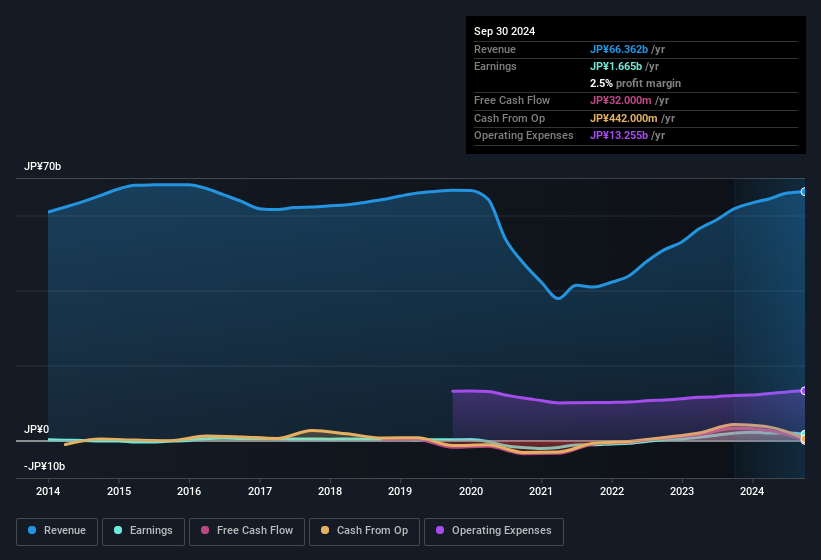- Japan
- /
- Food and Staples Retail
- /
- TSE:2708
We Believe That Kuze's (TSE:2708) Weak Earnings Are A Good Indicator Of Underlying Profitability
The recent earnings release from Kuze Co., Ltd. (TSE:2708 ) was disappointing to investors. We think that they may have more to worry about than just soft profit numbers.
See our latest analysis for Kuze

A Closer Look At Kuze's Earnings
As finance nerds would already know, the accrual ratio from cashflow is a key measure for assessing how well a company's free cash flow (FCF) matches its profit. In plain english, this ratio subtracts FCF from net profit, and divides that number by the company's average operating assets over that period. This ratio tells us how much of a company's profit is not backed by free cashflow.
Therefore, it's actually considered a good thing when a company has a negative accrual ratio, but a bad thing if its accrual ratio is positive. That is not intended to imply we should worry about a positive accrual ratio, but it's worth noting where the accrual ratio is rather high. To quote a 2014 paper by Lewellen and Resutek, "firms with higher accruals tend to be less profitable in the future".
Kuze has an accrual ratio of 0.34 for the year to September 2024. Unfortunately, that means its free cash flow was a lot less than its statutory profit, which makes us doubt the utility of profit as a guide. In fact, it had free cash flow of JP¥32m in the last year, which was a lot less than its statutory profit of JP¥1.67b. Kuze shareholders will no doubt be hoping that its free cash flow bounces back next year, since it was down over the last twelve months. However, that's not all there is to consider. The accrual ratio is reflecting the impact of unusual items on statutory profit, at least in part. The good news for shareholders is that Kuze's accrual ratio was much better last year, so this year's poor reading might simply be a case of a short term mismatch between profit and FCF. As a result, some shareholders may be looking for stronger cash conversion in the current year.
Note: we always recommend investors check balance sheet strength. Click here to be taken to our balance sheet analysis of Kuze.
The Impact Of Unusual Items On Profit
The fact that the company had unusual items boosting profit by JP¥420m, in the last year, probably goes some way to explain why its accrual ratio was so weak. While it's always nice to have higher profit, a large contribution from unusual items sometimes dampens our enthusiasm. When we crunched the numbers on thousands of publicly listed companies, we found that a boost from unusual items in a given year is often not repeated the next year. Which is hardly surprising, given the name. If Kuze doesn't see that contribution repeat, then all else being equal we'd expect its profit to drop over the current year.
Our Take On Kuze's Profit Performance
Kuze had a weak accrual ratio, but its profit did receive a boost from unusual items. Considering all this we'd argue Kuze's profits probably give an overly generous impression of its sustainable level of profitability. Keep in mind, when it comes to analysing a stock it's worth noting the risks involved. For example, we've found that Kuze has 3 warning signs (2 are a bit concerning!) that deserve your attention before going any further with your analysis.
In this article we've looked at a number of factors that can impair the utility of profit numbers, and we've come away cautious. But there is always more to discover if you are capable of focussing your mind on minutiae. For example, many people consider a high return on equity as an indication of favorable business economics, while others like to 'follow the money' and search out stocks that insiders are buying. While it might take a little research on your behalf, you may find this free collection of companies boasting high return on equity, or this list of stocks with significant insider holdings to be useful.
Valuation is complex, but we're here to simplify it.
Discover if Kuze might be undervalued or overvalued with our detailed analysis, featuring fair value estimates, potential risks, dividends, insider trades, and its financial condition.
Access Free AnalysisHave feedback on this article? Concerned about the content? Get in touch with us directly. Alternatively, email editorial-team (at) simplywallst.com.
This article by Simply Wall St is general in nature. We provide commentary based on historical data and analyst forecasts only using an unbiased methodology and our articles are not intended to be financial advice. It does not constitute a recommendation to buy or sell any stock, and does not take account of your objectives, or your financial situation. We aim to bring you long-term focused analysis driven by fundamental data. Note that our analysis may not factor in the latest price-sensitive company announcements or qualitative material. Simply Wall St has no position in any stocks mentioned.
About TSE:2708
Kuze
Engages in the food wholesale business for food service industries in Japan and internationally.
Flawless balance sheet average dividend payer.
Market Insights
Community Narratives




